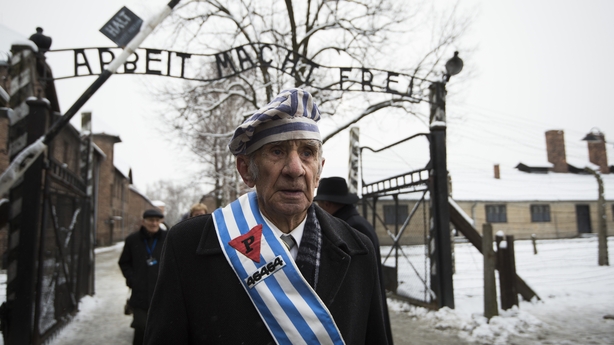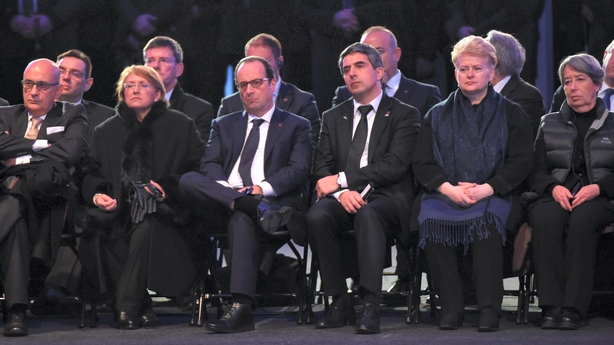World leaders have joined around 300 Auschwitz survivors at the site of the former Nazi death camp to mark 70 years since its liberation by Soviet Troops.
The gathering in southern Poland marks perhaps the last major anniversary that survivors of the camp will be able to attend in numbers, given the youngest are now in their 70s.
More than 1.1 million people, mainly European Jews, were killed by the Nazis at Auschwitz between 1940 and 1945.
The presidents of Poland, Germany and France were among hundreds attending the commemoration in a giant tent erected over the brickwork entrance to the Auschwitz II-Birkenau camp, part of the complex that is now a museum.

The railway tracks that bore Jews in wagons from all across Europe to their deaths were lit up gold, the countryside around covered in deep snow.
The commemoration was held in the shadow of war in neighbouring Ukraine, a spate of assaults on Jews in Europe and a recrudescence of open anti-Semitism.
"Seventy years later, the daily cruelty is still etched in my mind," former prisoner Roman Kent told the gathering.
"To remember is not enough; deeds are crucial," said Mr Kent.
"It is our mutual obligation - the survivors and world leaders - to install an understanding of what happens when prejudice and hatred are allowed to flourish."
A string quartet played the work of Szymon Laks, a Polish Jewish composer who led the prisoners' orchestra of Auschwitz-Birkenau and managed to survive the war.
David Wisnia, an 88-year-old survivor of Auschwitz, sang a funeral prayer of the Ashkenazi Jews, moving some of those present to tears.
Liberation anniversary focuses on survivors
Virtual tour of Auschwitz I and Auschwitz II Birkenau camps
Nazi camps: From evacuation to liberation
Seated among the survivors were the heads of state of Germany, France and other nations.

Minister for Foreign Affairs Charlie Flanagan represented Ireland at the event.
Speaking in Poland, he said: "We must never forget the inhuman cruelty and industrial scale murder that took place here and in other death camps across Europe."
French President Francois Hollande made the trip less than three weeks after 17 people, four of them Jews, were killed in Paris by Islamist gunmen in attacks on the Charlie Hebdo satirical weekly newspaper and a kosher supermarket.
Speaking earlier in the day at the Paris Shoah memorial, Mr Hollande addressed France's 550,000-strong Jewish community.
He said: "You, French people of the Jewish faith, your place is here, in your home. France is your country."
More than 1m people, mainly European Jews, were gassed, shot, hanged and burned at the Nazi German death camp in southern Poland, before the Soviet Red Army entered its gates in the winter of 1945 during its decisive advance on Berlin.
Auschwitz has become probably the most poignant symbol of a Holocaust that claimed six million Jewish lives across Europe.
German Chancellor Angela Merkel said Germans had an everlasting responsibility to fight all forms of anti-Semitism and racism.
"We've got to expose those who promote prejudices and conjure up bogeymen, the old ones as well as the new," Ms Merkel said on the eve of the anniversary, in apparent reference to the right-wing grassroots PEGIDA movement in Germany.
The camp's victims included, among others, Roma, homosexuals and all shades of political opposition to the Nazis.
Notable for his absence was Russian President Vladimir Putin, whose support of pro-Russian separatist rebels in Ukraine has helped drive Western-Russian relations to their lowest ebb since the Cold War ended 25 years ago.
Poland has been one of the most vociferous critics of Russia's annexation of Ukraine's Crimean peninsula last year and its support for Russian-speaking rebels in eastern Ukraine.
Keen to avoid a domestic political furore, Poland did not send a full diplomatic invitation to Mr Putin, according to sources.
"It would be hard to imagine, in this situation, hosting Russia's president. Albeit informally, Russia is taking part in this (Ukraine) conflict," Polish Justice Minister Cezary Grabarcyk told Polish ZET radio.
NATO says Russia has sent men and armour to aid the separatists. Mr Putin denies this, but risks new sanctions when European Union foreign ministers meet on Thursday.
Among those who made the return trip to Auschwitz for the first time today was 84-year-old Susan Pollack, who made Britain her home after the war having lost her mother to the camp's gas chambers.
She told Reuters: "If at all possible, I'm hoping maybe some relief will come.
“And I want cry it out, because back then crying in the camp meant weakness, and weakness meant death."
Meanwhile, Britain is to build a new Holocaust memorial in central London to which the government will contribute £50m (€67m).
The memorial will be built along with an education centre in a bid to ensure that the lessons of WWII are never forgotten.

